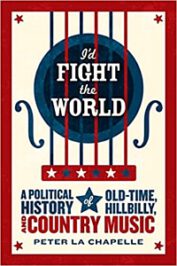American political campaigns without music or shows would be an impossibility today. Speaking about the 20th century, neither marching band tunes, nor folk songs or hymns were the musical style employed most by political representatives running for office, but country music, as author La Chapelle proves.
He finds many more details of this particular relationship in I’d Fight the World. And moreover, country music’s nature, by commenting on conditions of life, is political, too.
 Historically, this bond includes various combinations such as amateur country musicians running for political office while performing themselves, professional musicians who did the same, and nonmusician politicians of all levels using country music to attract crowds at rallies “… to create public images that they believed resonated with voters.” So reality TV or Hollywood actors were not the first ‘unusual’ aspirants for even the highest political office in America; before them, several musicians of equal fame and media coverage tried too.
Historically, this bond includes various combinations such as amateur country musicians running for political office while performing themselves, professional musicians who did the same, and nonmusician politicians of all levels using country music to attract crowds at rallies “… to create public images that they believed resonated with voters.” So reality TV or Hollywood actors were not the first ‘unusual’ aspirants for even the highest political office in America; before them, several musicians of equal fame and media coverage tried too.
However, there is the risk that potential voters decide to favor one candidate over another simply because he brought on the best show, had the best entertainers and gave audiences a good time. No matter what his or her political agenda may be; audiences may remember the good show, the music and the artists and cast then their votes.
In the last two centuries, political campaigns often were very welcome entertainment in small towns. Several candidates at their rallies for voters in the south or south west employed professional country musicians, already in the 1930s. Even before that, between “… 1878 and the turn of the twenty-first century, country music, and it predecessors and related genres – old-time fiddle, cowboy, hillbilly and bluegrass music – were central aspects of campaigning for more than a dozen major-party governors, several congressman, at least seven US senators, a Senate minority, and a Senate minority leader…”
Technology naturally changed and facilitated the use of music for electoral campaigns. By the 1940s, “… the growth of a national country music industry allowed nonperforming candidates to latch on to particular hit songs to sell their message, or to hire nationally renowned stars from the Grand Ole Opry to pitch for them at rallies and campaign stops. Television, too, reshaped the way candidates used country music, allowing them to not only celebrate the genre but also use recorded songs at broadcast rallies. Specially prepared songs in TV spots became part of their media barrage.”
La Chapelle, professor of history at Nevada State College, has examined lots of campaigns and identified both the abilities of country music luminaries to adopt to cooperation (not always rewarding for their careers), and the strong belief of many political campaign managers in the power of a highly popular American musical genre.
Certainly, there are simplified, i.e. populist mechanisms at work in countless country songs, as they do not just tell of the beauty of the range, but of life’s hardship, depression, hurt, despair and the individual’s powerlessness. They do so probably more directly and authentically than most other genres. The lyrics here also often are about the simple, hard-working men or those living in rural areas, where the people’s love for their country is deemed to be particularly strong.
From the politician’s point of view, this is a huge electorate he or she wants to interest in a campaign and employing straightforward and authentic slogans (or lyrics) may prove successful. Even more so, if the approach, the voice and the message sound familiar, as they resonate heavily with a country music listening experience.
La Chapelle’s insights also show how political and pop cultural personalities and their respective strategies sometimes went hand in hand; one working hard to grow in the popularity of the other. Alternatively, in the cases of professional musicians running for office, how they altered their messages, style or campaigns to maintain credibility politically and musically.
He lists remarkably many details that explain the huge network of music publishers, artists, tour managers, sponsors, politicians and local authorities, and not to forget the local fan bases all involved in keeping those alliances alive. Not to mention the stories behind a number of (hit) records and the respective clones that were designed for such purposes on Nashville’s Music Row. Or when popular country tunes or choruses were performed at rallies, only with different lyrics, now using key concepts or excerpts from the campaigns of a certain candidate instead.
So it comes not as a surprise to learn about songs and shows by country stars such as Roy Rogers, Johnny Cash, Roy Acuff, Willie Nelson, Gene Autry, Milton Brown, Patsy Montana and others that were performed for a certain politician or senator. La Chapelle comments on more than twenty presidential campaigns, including those of Ronald Reagan, Jimmy Carter, Franklin Delano Roosevelt, George C. Wallace, Estes Kefauver, and Richard Nixon. An intriguing book, that covers another aspect of country music, namely its lot-quoted authenticity and credibility and how these traits were employed and exploited by other groups.
Review by Dr. A. Ebert © 2020
Peter La Chapelle. I’d Fight the World: A Political History of Old-Time, Hillbilly, and Country Music. University of Chicago Press, 2019, 354 p.
